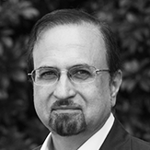Date
21 June 2023
In June 2023, Scientia Professor Perminder Sachdev travelled to Tasmania from NSW as part of the Travelling Scholar program. He presented in various locations including Hobart, Launceston and Burnie.
Is dementia preventable? Examining the evidence
Hobart presentation
With the rapid increase in the health burden of dementia globally, there is an urgent need to develop and implement strategies to prevent dementia and/or postpone its onset. In the absence of effective pharmacological interventions for primary prevention, the focus has shifted to lifestyle and vascular risk factors. The modifiable risk factors identified in the literature include vascular factors (hypertension, diabetes, atherosclerosis, high cholesterol, mid-life obesity, smoking), low brain reserve (low education, complex mental activity or physical activity and poor social network), nutritional factors (low intake of antioxidants, high homocysteine, high alcohol use) and other (hearing loss, air pollution, depression and head injury).
The quality of evidence for these factors is varied, with most evidence being obtained from case control and observational cohort studies. Only some factors have been subjected to randomised control trials. The basic science evidence is not always consistent. There have been some recent large intervention trials for preventing cognitive decline. There is also emerging evidence that the incidence of dementia may be declining in some high income countries.
This talk will examine some of the available evidence, identify the gaps in the literature and suggest a way forward. It will also ask the question whether observational evidence is sufficient to support large scale investment in interventions.
Speakers

Scientia Professor Perminder Sachdev
Perminder Sachdev AM, MBBS, MD, PhD, FRANZCP, FAAHMS is Scientia Professor of Neuropsychiatry at UNSW Sydney (UNSW), Co-Director of the Centre for Healthy Brain Ageing (CHeBA), UNSW, and Clinical Director of the Neuropsychiatric Institute, Prince of Wales Hospital in Sydney, Australia. His early work in Neuropsychiatry was on drug-induced movement disorders, in particular akathisia, tardive dyskinesia and neuroleptic malignant syndrome. His most recent work has been in dementia and pre-dementia syndromes, in particular relating to neuroimaging, neuropsychology, biomarkers and risk factors. He has extensively examined the outcome of psychosurgery and is currently involved in examining brain stimulation techniques (TMS, DCS, VNS and DBS) for psychiatric disorders.
In 2022 Prof Sachdev was awarded the Ryman Prize in recognition of research that has substantially enhanced the life of older people around the world. The Ryman Prize is the world's richest prize of its type and was established to create the equivalent of a Nobel Prize for people working in the field of the health of older people.
Perminder Sachdev AM, MBBS, MD, PhD, FRANZCP, FAAHMS is Scientia Professor of Neuropsychiatry at UNSW Sydney (UNSW), Co-Director of the Centre for Healthy Brain Ageing (CHeBA), UNSW, and Clinical Director of the Neuropsychiatric Institute, Prince of Wales Hospital in Sydney, Australia. His early work in Neuropsychiatry was on drug-induced movement disorders, in particular akathisia, tardive dyskinesia and neuroleptic malignant syndrome. His most recent work has been in dementia and pre-dementia syndromes, in particular relating to neuroimaging, neuropsychology, biomarkers and risk factors. He has extensively examined the outcome of psychosurgery and is currently involved in examining brain stimulation techniques (TMS, DCS, VNS and DBS) for psychiatric disorders.
In 2022 Prof Sachdev was awarded the Ryman Prize in recognition of research that has substantially enhanced the life of older people around the world. The Ryman Prize is the world's richest prize of its type and was established to create the equivalent of a Nobel Prize for people working in the field of the health of older people.
Disclaimer
This session is a Member benefit of the RANZCP and for educational purposes only. The information may represent views of the author and not necessarily the views of the College. Information is subject to change and the College does not warrant that the information is current at the time of viewing and accepts no liability for any loss or damage suffered by you or a patient directly or indirectly as a result of relying on information provided and should not be a substitute for individual clinical judgement. By accessing e-learning sessions you also agree to the RANZCP Website Terms of Use Agreement.
